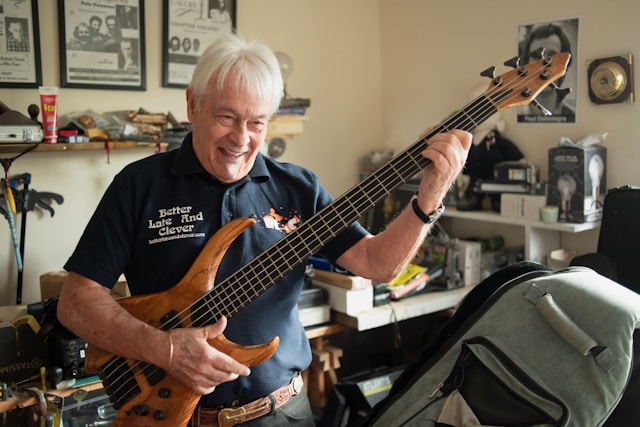
Effective Music Therapy for Dementia
Music therapy is a wonderful and effective way to support people living with Alzheimer’s disease and dementia. It’s been shown to brighten mood, ease difficult behaviours, and help with thinking skills like memory and attention. Music therapy can also help with things like depression, anxiety, and agitation that often come with dementia. Whether it’s listening to music, singing along, or playing instruments, these activities can bring back memories and help manage emotions, making music therapy a powerful, drug-free way to support your loved one.
Specially trained music therapists design personalised music activities tailored to each person’s needs, including those who have advanced dementia and may need a gentler approach. Music therapy can happen in groups or one-to-one, using the emotional and brain connections that often stay active even as dementia progresses. Group music sessions can boost social interaction and make people feel more engaged and included, which is so important because social isolation can worsen dementia symptoms. Aside from mood improvement, music therapy offers a gentle routine and structure, providing moments in the day to look forward to. This routine can ease loneliness or confusion and help your loved one feel more secure and settled. For carers, these sessions can also be a wonderful opportunity to connect and create new memories together.
Understanding Alzheimer’s Disease
Alzheimer’s disease affects the brain gradually, impacting memory, language, and daily problem-solving. It usually progresses through stages called early, middle, and late—or mild, moderate, and advanced Alzheimer’s. Everyone’s journey is unique. In the early stage, your loved one might forget things from a few moments ago or struggle to recall names, but they can often still manage daily tasks and enjoy time with friends or family. You might notice changes in their mood, like feeling frustrated or upset more easily. It’s important to be patient and supportive during this time, offering gentle reminders and maintaining regular routines that can help them feel more confident.
As Alzheimer’s advances to the middle stage, memory loss becomes clearer. They might lose track of time, get confused about places, or not always recognise family members. Mood swings, including anxiety and agitation, can be common. Communication can become more difficult. At this stage, music therapy can be especially valuable to ease distress caused by behavioral and psychological symptoms and encourage moments of joy and recognition, even when words fail. In the late stage, they’ll likely need more help with everyday things like eating, dressing, or moving around. Speech and responses may change significantly. Music remains a source of comfort and can even open windows to past memories and feelings, bringing moments of calm and peace.
One hopeful thing about Alzheimer’s is that music and songs often remain familiar far longer than other memories. This is because certain brain areas involved in musical memory and autobiographical memory re less affected by the disease. Music can reconnect your loved one to feelings and memories that seem lost, calming them and enhancing communication throughout all stages.

Benefits of Music for Cognitive Functions
If you’re caring for someone with dementia, music can be a comforting and uplifting tool for both of you. Research shows that even in later stages, familiar tunes can lift mood, increase alertness, and encourage emotional expression. Sharing music can help your loved one feel understood and connected, no matter their cognitive level. Music’s positive effects go beyond just enjoyment. Listening to music, especially classical pieces like those by Mozart or Bach, has been shown to support memory, cognitive abilities, and thinking skills. Music also supports language abilities and can act as a memory booster—even unfamiliar music can serve as a gentle cue for memory recall.
For example, families often share stories of how a favourite childhood song brought a smile or triggered a happy memory during difficult times. It’s these moments that show how music holds an emotional power separate from other memories. Besides helping with memory, music encourages movement—tapping, clapping, or gentle dancing—which can improve physical wellbeing. Many carers find music reduces tension, anxiety, and aggressive behaviour, making caring less stressful. Music therapy sessions create peaceful and meaningful moments that strengthen emotional bonds and enrich daily life for both your loved one and you.
Music Intervention for People Living with Dementia
Personalised music therapy works best when it matches your loved one’s taste and life story. Everyone has favourite songs that mean something special, so customising playlists is key to addressing subjective cognitive decline . Music therapists often start by creating playlists focused on songs from the teenage years through early adulthood—known as the “reminiscence bump”—because these tunes are closely tied to lasting memories and feelings. These can be played through speakers, headphones, or used during live sessions with singing or simple instruments. Music therapy helps reduce anxiety, restlessness, and distress while lifting mood and mental engagement. It can also help manage behavioural symptoms such as depression and apathy. Therapists or carers pay close attention to how your loved one reacts to music, as supported by randomised controlled trials changing the playlist if needed to keep things positive and comforting.
Besides calming effects, personalised music activities offer social connection. Singing groups and music-making bring people together, easing loneliness for your loved one and offering chances to communicate without words. Being able to use music during daily care can also provide calm during challenging routines. For example, playing gentle, familiar melodies during dressing or mealtimes can reduce frustration and create a soothing atmosphere. Training carers to use personalised playlists as part of daily routines can enhance care quality. It’s empowering to have different individualised music interventions as a tool you can use anytime to support your loved one’s wellbeing and help you connect in new ways.
People with Dementia and Music Preferences
Each person with dementia has their own unique music preferences that reflect their background, culture, and memories. Knowing and respecting these preferences helps make music therapy more meaningful. Familiar songs from youth or early adulthood usually have the strongest impact, helping people recall memories and emotions. Research in the UK shows that personalised playlists, created with family input, improve engagement and wellbeing.
Preferred music can include classical, folk, pop, or jazz—whatever your loved one enjoys. Classical music, particularly composers like Mozart and Bach, has also been found to support cognition and memory. Many families and care providers see how music reduces loneliness and helps people express feelings when talking is hard. Music for My Mind and similar UK projects provide tools to help families use personalised music in daily care, making it easier to support your loved one. Using music your loved one enjoys also promotes their dignity and individuality. It reminds everyone that despite dementia, your loved one’s sense of self and individuality remain intact as they are still the unique person they always were, with their own tastes, experiences, and emotions.
How Cedar Lodge Care Home’s Music Room Supports Wellbeing in Dementia Care
At Cedar Lodge Care Home in Taunton, music is a key part of life, especially for residents living with dementia. Our Music Room is a warm, inviting space full of familiar instruments and treasured items designed to spark memories and emotions safely. The team at Cedar Lodge works closely with residents to create music experiences tailored to each person’s tastes and history, using music to improve mood, ease anxiety, and build connections between residents, families, and staff. If you’re considering a care home that values music therapy and person-centred care, Cedar Lodge offers a welcoming place focused on enhancing quality of life through meaningful music activities. Get in touch to book a tour of our home.
